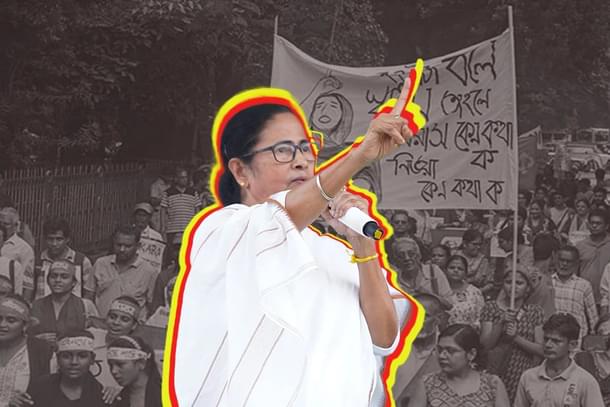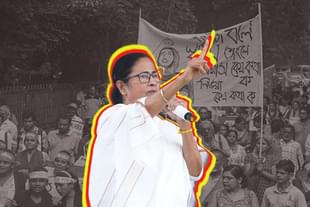West Bengal
Why Mamata Banerjee Must Go
K Bhattacharjee
Aug 30, 2024, 08:00 AM | Updated Sep 05, 2024, 11:16 AM IST
Save & read from anywhere!
Bookmark stories for easy access on any device or the Swarajya app.


The Trinamool Congress government in West Bengal stands at a precipice today.
The popularity levels of Mamata Banerjee are at their lowest point now, lower than they have ever been since she first assumed the office of Chief Minister in 2011.
Her primary opposition party, the Bharatiya Janata Party (BJP), has succeeded in building a diverse coalition of people, often from antagonistic ideological backgrounds, that has hit the streets demanding justice for the victim of the brutal rape and murder at the R G Kar Medical College.
To put it succinctly, things are not going very well for Banerjee and her party at the moment. The less said about her political prospects, the better.
Consistent with her approach towards critics and controversies, the Chief Minister of West Bengal has chosen to brazen it out. After all, it is a strategy that has worked out well in the past. Be it the Park Street rape case, the Nadia and Katwa rape cases, or the organised crime racket in Sandeshkhali, Banerjee's responses to these cases were either categorised as denial or faced serious charges of being coverup attempts.
And bizarrely enough, none of these allegations seemed to dent her political prospects or her approval ratings among women.
She is made of teflon, or so it seemed until now.
Perhaps there's a limit to how much a politician can effectively gloss over, or it could be that the coat of teflon around her has weakened significantly due to years of wear and tear, or the nature of the alleged cover-up attempt in the R G Kar Case was so blatant that it was impossible for anyone to brazen it out with a straight face. Whatever the reason, it has undeniably dented her popularity.
It is for the first time in 13 years that a call for Banerjee’s resignation has gained widespread momentum across all sections of society. The calls for the Chief Minister to step down were not limited to BJP supporters alone. The left-leaning youth of Kolkata, apolitical professionals, and the middle-class, staunch communists, the ordinary masses of the state — all sections spoke out in one voice: 'Mamata Banerjee Must Resign'.
There are sufficient indications to suggest that the 'TMC Supremo' believed it would be one of those occasions where the outrage would intensify for a couple of days and then fizzle out. After emotions cool down, everyone would forget how the hospital authorities and Kolkata police handled the case. Given what happened in Sandeshkhali, one cannot fault her for reaching that conclusion.
But one crucial fact she apparently overlooked was that the people of Bengal would realise a fair investigation was unlikely while she remained in charge.
Let us look at why this is so.
Initially, the authorities — it is unclear whether it was the hospital authorities alone or Kolkata police was also a part of it — attempted to pass off the rape and murder as suicide. Given the extent of the injuries observed on the body of the victim and detailed in the postmortem report, it is impossible that anyone could have looked at the victim’s corpse and come to a reasonable conclusion that it was a suicide. That was the first indication that a cover-up attempt was underway.
Then, renovation work was carried out uncomfortably close to the crime scene. “We are shocked that the adjoining areas of the crime scene are being dismantled in the name of renovation,” said the convenors of the Joint Platform of Doctors West Bengal about the construction work.
Further still, a mob attacked the R G Kar Medical College in the dead of the night on 14 August while major protests were underway at the institute. The mob vandalised the hospital, assaulted the doctors present, and threatened them.
This mob was not composed of 10 or 20 individuals, or even 50 or 1,000. It was a mob thousands of miscreants strong, estimated to be as many as 7,000.
All of this points towards a coordinated effort at a cover-up that only became more brazen as the days went by. To top it all off, Sandip Ghosh, the disgraced principal of the medical college on the night of the crime, was removed from his position and almost immediately awarded with a post that was by all measures a promotion.
The ultimate responsibility to answer for all of the above lies with Banerjee. She is the Health Minister of West Bengal. She is the Home Minister of West Bengal. She is the Chief Minister of West Bengal. The affairs of the medical college rest with the Health Ministry. Kolkata police report to her.
It is for these reasons that when she organised a protest march of her own over the incident, it only evoked reactions entirely antithetical to the ones she intended to evoke. Unlike previous occasions, it only inspired mockery and ridicule and memes.
Leaving everything aside, that is the fundamental reason why Banerjee has to resign. Not because the BJP or the Communist Party of India (Marxist) (CPI(M)) are demanding her resignation, not because the doctors and medical healthcare professionals are demanding that she take accountability for the sorry state of affairs and hand in her papers, not because the ordinary masses of West Bengal want her gone.
She has to resign because a free and fair investigation into the case is unlikely to be conducted while she continues to occupy positions of power. She has to resign because a free and fair investigation is unlikely when those who need to be investigated closely are being shielded fiercely.
The political ramifications of the R G Kar rape case for Banerjee herself remain uncertain as of this moment. The next assembly election in West Bengal is scheduled for 2026, and two years is a long time to recover lost political ground, especially since the Trinamool Congress has a 30 per cent minority vote bank locked in that will not desert her no matter what.
However, the current protests are the strongest threat to her political dominance that she has faced thus far. That much is evident from the manner in which she has been reacting to it. A politician confident of her hold on power does not resort to threatening the peace and prosperity of all the neighbouring states and regions and the capital of the country for good measure. These are the actions of a politician who has seen the writing on the wall.
History, meanwhile, will not remember her kindly. When one looks back at the stellar rise of Banerjee all those years ago and compares that with what she has turned into in recent years, it will reveal a spectacular betrayal of promise, of hope, and of the people who held faith in her.
The year 2011 was actually a ‘What Could Be, Unburdened By What Has Been’ moment for the state of West Bengal, as United States Vice President Kamala Harris would put it. It is rather unfortunate that Banerjee’s ‘What Could Be’ turned out to be just as bad, if not worse, than ‘What Has Been’ under the erstwhile communist regime.
Like her predecessors, she has facilitated an organised decline of West Bengal. As incredible as it seems today, it was once hoped that under her, the state would course-correct and reverse the decades of decline it had suffered under communist rule. Lamentably, she has only accelerated the decline.
West Bengal is now at a point where shielding rapists, daylight shootings of political opponents, organised crime ‘syndicates’, and lawlessness have become the norm.
The solution to alcohol abuse could never be more alcohol consumption. Similarly, the solution to the problems created and encouraged by Banerjee could never be five more years of her rule, or even two more years.
It is only when Banerjee is firmly in West Bengal’s past that the people of Bengal can look forward to a better, brighter future — to a future where there is at least a semblance of sanity in the routine affairs of the day.
K Bhattacharjee writes on politics and international affairs.





